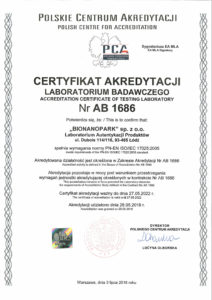Laboratories
The Industrial Biotechnology Laboratory (LBP) offers a very wide range of works and services that allow the design and development of biotechnological processes within working volumes of 1 millilitre to 150 litres. The Laboratory conducts research on optimisation of microbiological cultures, taking into account upstream and downstream processing. Optimisation of the conditions of enzymatic reactions, as well as bioconversion and biotransformation of a wide range of substrates are also offered here. LBP offers comprehensive research within analytical and microbiological techniques dedicated to environmental protection, pharmacy, cosmetics, textile industry, and food industry. LBP also develops and optimises synthesis pathways, as well as methods of separation and purification of chemical substances.
The Laboratory is approved by the Ministry of Environment for the use of GMO in a closed system.
CONTACT
Tel: +48 42 280 76 56
The Laboratory conducts research to evaluate benefits and risks arising out of the use of innovative products. It specialises in characterising materials made with such technologies as nanotechnology, biological and material engineering, as well as in their biological evaluation based on in vitro testing and molecular biology techniques. Furthermore, the Laboratory provides services consistent with the principles of Good Laboratory Practice (GLP) within the chemical analysis and cytotoxicity and genotoxicity testing.
Integrals parts of the Laboratory are also: Individual Medical Implants Unit and Veterinary Implants Unit.
In order to meet customer requirements, the Laboratory performs also other research projects falling beyond its main specialisation profile if equipment allows it.
CONTACT
Marta Skorzepa
Tel: +48 42 280 76 78
Stable isotope analysis is an useful tool in the control of declared sources of product’s origin and methods of their preparation. Owing to this research, the risk of hazardous substances – intake, as well as introduction of counterfeit products, is minimized. Product authentication is based on the analysis of stable isotope ratios (2H/1H, 13C/12C, 15N/14N, 18O/16O, 34S/32S) in chemical compounds present in food products (food, food additives, non-alcoholic beverages, alcoholic beverages) and pharmaceuticals. There are two methods of measurement: isotope ratio mass spectrometry (irm-MS) and nuclear magnetic resonance isotope spectroscopy (irm-NMR).
The Laboratory operates according to ISO/IEC 17025: 2005 requirements in order to ensure tests`compliance with the best practice. This means that, thanks to the efficient operation of the system, our customers can be assured of the highest quality of services offered to them.
As the only one in Poland, Laboratory is accredited by PCA in the field of wine analysis.

CONTACT
Kamila Klajman
Tel. +48 42 280 76 91 or +48 42 280 76 92
Laboratory conducts research in the area of the organic materials and composites structure optimization and their use in electronic devices. In particular, it focuses on the preparation and characterization of the printed electronics elements operating parameters (organic light emitting diodes, organic photovoltaic cells and organic field effect transistors). Among others offer is addressed to the industrial broadly defined optoelectronic sector, which results in solutions of lighting, displays (organic light emitting diodes), as well as in photovoltaic cells. Organic materials investigated in laboratory are equally applicable to the construction of sensors based on the field effect transistors applied for the condition of the environment monitoring.
CONTACT
Sylwia Kotarba
Tel. +48 42 280 76 84 or +48 42 280 76 89
The Laboratory activities cover a wide spectrum of research related to the production and characterisation of nano- and micromaterials, e.g.:
- production of nanomaterials using chemical methods,
- examination of application properties and physical and chemical properties of nano- and microstructures,
- characterisation of materials in the form of powders, suspensions, and aerosols,
- examination of the nature of contrasts used for medical imaging based on metallic and magnetic nanoparticles,
- determination of the speed of release of nanomaterials from products to the environment
- characterisation of catalysts
- examination of the speed of drug release by nanomaterials, etc.
The Laboratory specialises in the imaging of preparations with the high-resolution transmission electron microscopy (TEM) and the atomic force microscopy (AFM). We have experience in studying various nanomaterials and biological preparations (the laboratory includes a cell culture unit).
CONTACT
Magdalena Kucińska
Tel: +48 42 280 76 78
Personalized medicine is the application of genetic information to predict disease development. By combining the data from sequence analysis of specific genes and mutations, an individual’s medical history, circumstances and values, a targeted treatment and prevention plans can be created. Targeted therapy can be prepared on the basis of drugs` analysis and chemical compounds with potential therapeutic effect using cell lines derived directly from the patient. Individual therapy compatible with specific markers determining the rapid diagnosis allows for adjusting preventative interventions or medical treatment to the individual needs of each patient.
The Laboratory is using the most advanced techniques of cellular and molecular biology and high throughput data bioinformatics in various cellular systems. Two leading techniques being developed by our team are confocal microscopy and next generation sequencing.
CONTACT
Tel. +48 42 280 75 41 or +48 42 280 75 40
This laboratory specialies in computational analysis. Its core is world`s unique hardware system: the Real Complex System Analyzer (25,000 FPGAs). Additionally we have computing cluster (330 cores).
Using computational chemistry without the use of laboratory synthesis, you can:
- Carry out preliminary studies and eliminate bad ideas and compounds
- Predict the properties of the new compound or material
- Reduce the amount of large resources, reagents, equipment and people
- Design next steps in synthesis
- Determine the hydrophilicity and hydrophobicity of the material
- Investigate the electron affinity, HOMO / LUMO orbital levels
- Simulate IR, UV-Vis, Raman spectra
- You can study toxic compounds, very expensive, radioactive, unstable,
transient reaction states and radicals.
CONTACT
Przemysław Nowak
tel.+48 515 705 008



